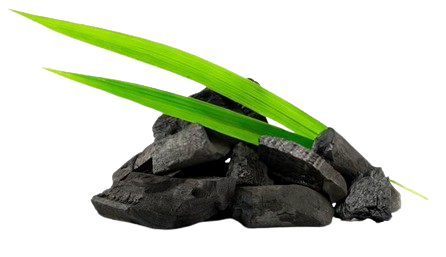Scientific Background
Why Lignite?

Lignite is a nonrenewable fossil fuel used as an energy source and can also be used as a plant and crop fertilizer. It is ranked depending on the types and amounts of carbon it contains, which is determined by the amount of pressure and heat that acted on the plants over time. (eia.gov)
Lignite contains elements that can be ionized by the biofertilizer, producing nutrients essential to growth and available for plant uptake. As the organic waste in the mixture decomposes, it produces ammonium ions, which build up on the surface of the zeolite.
When the mixture is added to the soil, it boosts the population of microorganisms responsible for nitrification, which is essential for plant nutrition. The biofertilizer also helps plants develop dense root systems that stabilize the soil against erosion. (sciencedaily.com)
What is Regenerative Agriculture?
Regenerative agriculture is a method of farming that focuses on improving the health of the entire ecosystem, including the soil, water, and air.
It emphasizes practices that build organic matter in the soil, enhance biodiversity, and promote sustainable farming.
This approach aims to reduce harmful chemicals, increase carbon sequestration, and create a more resilient and productive agricultural system. By using techniques such as cover cropping, crop rotation, and minimal soil disturbance, regenerative agriculture restores and improves the land's overall health while supporting the well-being of farming communities.
The Problems
With Industrialized Soil
Industrialized soil faces significant challenges both above and below the ground, posing a threat to the overall health of ecosystems.
Above The Ground
- Erosion of mineral soil is a pressing issue.
- Intensive agricultural practices, such as excessive tillage, contribute to soil exposure, making it vulnerable to the detrimental effects of rain, wind, dehydration, and structural problems.
These factors not only compromise the fertility of the soil but also lead to increased environmental degradation.
Glogens® Fertilizer & Nutrients
- Increase growth
- Improve nutrient uptake
- Improve photosynthesis efficiency
- Increase yields
- Deliver Healthier harvest
- Reduce losses to the environment
Under Ground
- The problems persist as industrialized soil contributes to pesticide water runoff, posing a severe risk to other interconnected systems, including groundwater.
- The presence of pesticides in water systems can have far-reaching consequences, affecting the quality of water resources and disrupting aquatic ecosystems
-
Moreover, the use of pesticides in industrialized agriculture can lead to the unintended consequence
of killing beneficial soil biology. This, in turn, results in:
Loss of biodiversity within soil, land, and water ecologies further destabilizes the delicate balance of natural ecosystems.
Addressing these challenges is crucial for sustainable agriculture and preserving environmental integrity.
Glogens® Fertilizer & Nutrients
- Increase soil quality and health
- Improve soil structure
- Nourish soil biology
- Multiply linear growth of roots
- Expand carbon allocation (root biomass, amount of energy used to produce photosynthate in the ground)